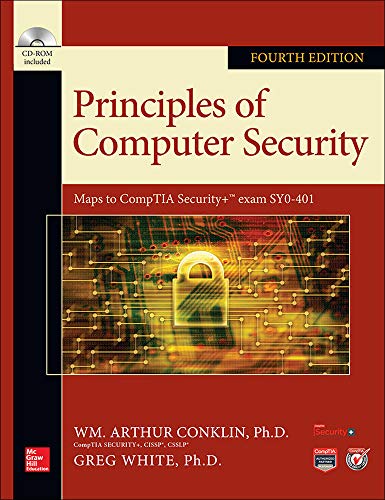Publisher's Note: Products purchased from Third Party sellers are not guaranteed by the publisher for quality, authenticity, or access to any online entitlements included with the product.
Written by leading information security educators, this fully revised, full-color computer security textbook covers CompTIA’s fastest-growing credential, CompTIA Security+.
Principles of Computer Security, Fourth Edition is a student-tested, introductory computer security textbook that provides comprehensive coverage of computer and network security fundamentals in an engaging and dynamic full-color design.
In addition to teaching key computer security concepts, the textbook also fully prepares you for CompTIA Security+ exam SY0-401 with 100% coverage of all exam objectives. Each chapter begins with a list of topics to be covered and features sidebar exam and tech tips, a chapter summary, and an end-of-chapter assessment section that includes key term, multiple choice, and essay quizzes as well as lab projects. Electronic content includes CompTIA Security+ practice exam questions and a PDF copy of the book.
Key features:
- CompTIA Approved Quality Content (CAQC)
- Electronic content features two simulated practice exams in the Total Tester exam engine and a PDF eBook
- Supplemented by Principles of Computer Security Lab Manual, Fourth Edition, available separately
- White and Conklin are two of the most well-respected computer security educators in higher education
- Instructor resource materials for adopting instructors include: Instructor Manual, PowerPoint slides featuring artwork from the book, and a test bank of questions for use as quizzes or exams
- Answers to the end of chapter sections are not included in the book and are only available to adopting instructors
Learn how to:
- Ensure operational, organizational, and physical security
- Use cryptography and public key infrastructures (PKIs)
- Secure remote access, wireless networks, and virtual private networks (VPNs)
- Authenticate users and lock down mobile devices
- Harden network devices, operating systems, and applications
- Prevent network attacks, such as denial of service, spoofing, hijacking, and
password guessing - Combat viruses, worms, Trojan horses, and rootkits
- Manage e-mail, instant messaging, and web security
- Explore secure software development requirements
- Implement disaster recovery and business continuity measures
- Handle computer forensics and incident response
- Understand legal, ethical, and privacy issues
Roger L. Davis is a Senior Internal Audit Manager at NuSkin Enterprises and is responsible for evaluating global business operations in over 35 countries. He is a retired Air Force Colonel with over 20 years of military and information security experience. Mr. Davis is a Certified Information Systems Security Professional (CISSP) and holds a Master’s Degree in Computer Science from George Washington University.
Chuck Cothren is a Research Scientist at University of Texas at San Antonio (UTSA) Center for Infrastructure Assurance and Security (CIAS) and currently serves on the Information Security Association’s Alamo Chapter Board of Directors. Mr. Cothren has a wide array of security experience including performing controlled penetration testing, network security policies, computer intrusion forensics, and computer training. He is a Certified Information Systems Security Professional (CISSP) and has co-authored other McGraw-Hill/Osborne titles. Mr. Cothren holds a B.S. in Industrial Distribution from Texas A&M University.
Greg White (San Antonio, TX), CompTIA Security+, CISSP, is an Associate Professor in the Department of Computer Science at the University of Texas at San Antonio. Dr. White is the Director of the Center for Infrastructure Assurance and Security at UTSA.
Wm. Arthur Conklin, Ph.D., CompTIA Security+, CISSP, is an associate professor in the Information and Logistics Technology Department at the University of Houston.
Greg White, Ph.D., is a professor in the Department of Computer Science at the University of Texas at San Antonio. He is the director for the Center for Infrastructure Assurance and Security at UTSA.
Corey Schou, Ph.D., series editor, is a fellow and vice chairperson of (ISC)2, the University Professor of Informatics and professor of Computer Science at Idaho State University, and the director of the Informatics Research Institute and the National Information Assurance Training and Education Center (NIATEC).
